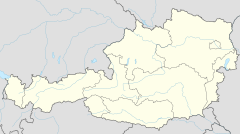Seckau Abbey
This article needs additional citations for verification. (April 2015) |
| Seckau Abbey | |
|---|---|
 Seckau Abbey, Styria, Austria | |
| Religion | |
| Affiliation | Catholic Church |
| Ecclesiastical or organizational status | Abbey |
| Year consecrated | 1164 |
| Status | Active |
| Location | |
| Location | Seckau in Styria, Austria |
| Geographic coordinates | 47°16′26″N 14°47′10″E / 47.273889°N 14.786111°E |
| Architecture | |
| Type | Abbey |
| Style | Romanesque |
| Founder | Archbishop Konrad I of Salzburg |
| Groundbreaking | 1143 |
| Website | |
| www | |
Seckau Abbey (Template:Lang-de) is a Benedictine monastery and Co-Cathedral[1] in Seckau in Styria, Austria.
History
Middle Ages
Seckau Abbey was endowed in 1140 by Augustinian canons. An already existing community in Sankt Marein bei Knittelfeld was moved to Seckau in 1142. This establishment was dissolved in 1782. At the request of Archbishop Konrad I of Salzburg, Pope Innocent II instituted the founding of the congregation and the transfer to Seckau on 12 March 1143. The abbey church, a Romanesque basilica, was built from 1143 to 1164, and was consecrated on 16 September 1164.
According to an old custom, the canons founded a double monastery. The women's chorus likely came to the abbey no later than 1150 from Salzburg, mentioned in a deed of the Noble Burchard of Mureck in 1150.
Seckau Abbey
In 1883 the monastery was resettled by Benedictines from Beuron Archabbey, who had had to leave Germany because of the Kulturkampf. In 1940 the monks were evicted by the Gestapo and the buildings were confiscated. In 1945 the monks were able to return.
The abbey maintains a secondary school ("Gymnasium") and carries out the duties of the pastoral care belonging to a parish.
It is part of the Beuronese Congregation within the Benedictine Confederation.
Abbey church
The abbey church, a Romanesque basilica, was built between 1143 and 1164. For centuries it was the place of burial of the Inner Austrian line of the Habsburgs.[2] In 1930 it was declared a minor basilica.
Gallery
-
Seckau Abbey
-
Seckau Abbey courtyard
-
Seckau Abbey inner courtyard
-
Basilica spires
-
Basilica Seckau - interior
-
Romanesque Crucifixion scene
-
Habsburg mausoleum
-
Habsburg Mausoleum, cenotaph
-
Habsburg mausoleum (detail)
In numismatics
Seckau Abbey was selected in 2008 as a main motif for a high value Austrian euro collectors' coin: the Seckau Abbey commemorative coin. The obverse shows a wide view of Seckau Abbey looking west. Located in the center is the Romanesque basilica with its two towers surrounded by the Baroque monastic buildings. The reverse shows a view from the main entrance of the church to the high altar, depicting the mediaeval crucifixion group hanging on four massive chains.
- „Seckau Abbey“ commemorative coin, 2008
-
Frontside
-
Backside
References
- ^ "Dom- und Abteikirche Mariä Himmelfahrt, Seckau, Steiermark, Austria". www.gcatholic.org. Retrieved 2016-06-23.
- ^ Template:De icon Seckau, Steiermark / Stiftsbasilika Archived 2016-03-03 at the Wayback Machine
External links
- Abtei Seckau official website Template:De icon
- Seckau Abbey (JPEG)
- Stift Seckau on TouristicViews.com Template:De icon
- States and territories established in 1218
- 1142 establishments in Europe
- Religious organizations established in the 1140s
- 1782 disestablishments in Europe
- Religious organizations established in 1883
- Augustinian monasteries in Austria
- Benedictine monasteries in Austria
- Basilica churches in Austria
- Christian monasteries established in the 12th century
- Monasteries in Styria
- Tourist attractions in Styria
- Roman Catholic cathedrals in Austria










